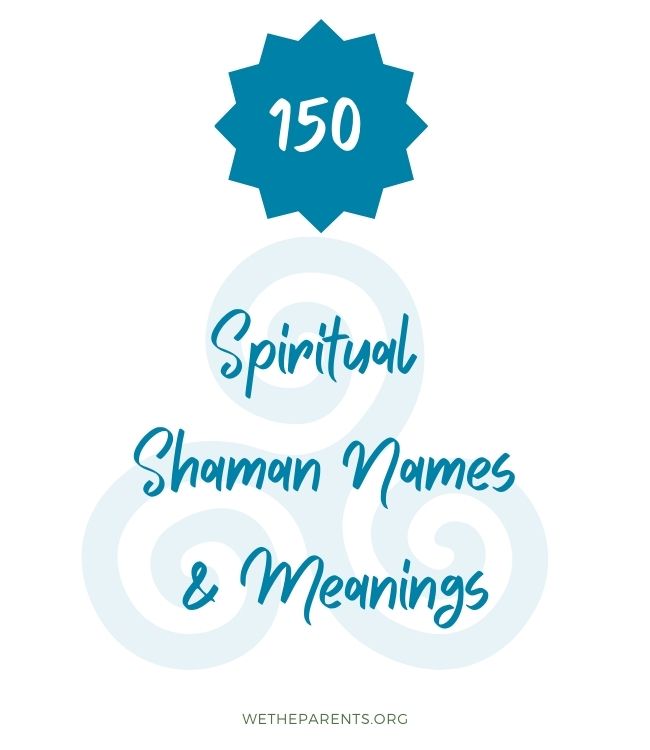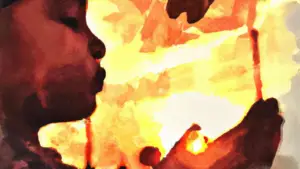Long associated with a connection to the spirit world, both good and evil, shamans are spiritual practitioners associated with healing and divine knowledge. Baby names that mean shaman are a unique twist on a spiritual moniker; they’re not associated with modern religion, but they have undeniable ties to the otherworldly and natural realms.
Shamanism is most closely associated with Asian and Native American cultures, and many shaman names are taken directly from Asian and Native American dialects.
Let’s dive in.
Male baby names
- Shaman – Shaman is an Indian name. It means “holy man.”
- Oyuun – Oyuun means “shaman” in Yakut.
- Icaro – This word means “magic song.” Icaro is a term used for the traditional music of South American medicine men and shamans.
- Suersaq – This shamanistic name stems from Greenland. It translates to “one healed by a shaman.”
- Susse – Susse is a traditional Yi name. It means “the son of a shaman.”
- Saman – The word shaman is probably derived from this Tungusic word. It is pronounced “shaman.”
- Shinto – Shinto is a Japanese religion that is centered around shamanism for an agricultural society.
- Baskoo Mudang – A basko mandang is a male shaman from North or South Korea.
- Tngri – Tngri was the Mongolian “god of heaven.” He sometimes goes by Möngke Tngri or Erketü Tngri. He rules over a group of 99 tngri.
- Tadibey – This is the name of a Samoyed shaman.
- Baksy – Baksy the term for a male shaman from Kyrgyzstan.
- Buge – Buge is a Buryat term for “shaman.”
- P’aqo – This is a traditional name for an Andean shaman. It is pronounced “Paco.”
- Siv Yis – Siv Yis was the name of the first official Hmong shaman. Siv Yis is said to have been a profound healer.
- Dukun – Dunkun is an Indonesian term for “shaman.” This moniker is pronounced “Duncan.”
- Malang – Malang means “mystic” in Pashto.
- Yachak – This is a name that the Kichwa people of the Ecuadorian Amazon give to their shamans.
- Txiv Neeb – This Hmong name means “father of the spirits.” Txiv Neeb is a key element of Hmong shamanism.
- Katalonan – Katalonin is an alternative name for a Phillipino shaman.
- Jigari – Jigari are “great spirits” recognized by Mongolian shamans
- Boge – In Mongolian culture, boge are less powerful male shamans known as “protector spirits.”
- Babaylans/Balian – These are two terms for well-respected Philippino shamans. These practitioners were focused on channeling the powers within nature.
- Anito – Phillipino shamans would strive to contact “anito” or spirits.
- Kiepja – Kiepja, was the last Selk’nam shaman.
- Bombo – Bombo is a name given to some Mongolian shamans.
- Chầu – Chầu is a traditional Vietnamese surname. Chầu văn is also a type of traditional Vietnamese art used by shamans.
- Jhakri – Jhakri is a Nepalese word for “shaman.” Shamanism is a common practice of the people of Nepal.
- Bomoh – A bomoh is a Malay shaman or medicine person. Most bomoh are also herbalists.
- Phedangbo – In the Limbu language, phedangbo means “shaman.”
- Curandero – Curanderos are shamans from Peruvian Amazon basin. The name means “healer who uses folk remedies.” Peruvian shamans are known to use plant-based materials in their rituals.
- Arpachshad – Arpachshad is a Jewish name that means “healer or helper.”
- Angakok – This is the name of a well-documented Inuit shaman.
- Angatkuq – This is an alternative spelling for the name of the Inuit shaman Angakok.
- Taqui – Yaqui was the name of a famous Moki Sanke priest and healer.
- Paqo – Paqo is the name given to the mystical leaders of the Q’ero people of South America.
Female baby names
- Beata – This name is sometimes given to female shamans of Spain. It is derived from the Latin word for “blessed.”
- Ona – Ona is another name for the Selk’nam people. Their indigenous culture centered around shamanism.
- Sangha – A sangha is a Buddhist community consisting of monks, nuns, and other religious devotees.
- Feri – Feri is a type of modern Pagan witchcraft that pulls elements from shamanism.
- Kundalini – Kundalini is a term used in yoga practice. It means “the latent female spirit.” This energy is said to be stored at the foot of the human spine.
- Paititi – This is a utopian city that is often referenced by Incan shamans.
- Paititi – This is thought to be a spiritual sanctuary for the Q’ero. Like the Christian heaven, it is a place that people transcend to after they die.
- Vajra – This is the word for mystical thunderbolt that is wielded by the god Indra.
- Apiana – Salvia apiana is the scientific name for white sage. This plant is closely associated with the healing ceremonies of many indigenous people.
- Chayanyi – Chayanyi is a name given to Keresan shamans.
- Anyi – Anyi is the Q’ero word that means “everything is connected.”
- Baqshi – In Kazakhstan, basqshi are traditional shamans. This feminine-sounding word is perfect for any wise babe with Middle Eastern roots.
- Ayahuasca – Ayahuasca is a plant consumed in a shaman-lead ritual. It is native to the Peruvian Amazon.
- Fugara – Fugara is a Bedouin form of shamanism. Fugara means “weak.”
- Alignalghi – This Asian Eskimo word translates to “shaman.”
- Asog – Asog is the name given to female shamans from the Philippines.
- Anja – Anja Normann is a well-known Swedish shaman. Anja means “God has favored me.”
- Amazonia – Amazonia is a region that is known for its nature-connected shamans. Many of these spiritual leaders specialize in the use of ayahuasca.
- Natigai – Natigai is the name for a Mongolian “earth mother.”
- Bajasa – Basaja is Indonesian word for “shaman.”
- Ghigau – Ghigau was the name given to a Cherokee medicine woman.
- Mystic – Mystic is another word for a shaman.
- Eturgen – Etugen means “female shaman” in Mongolian.
- Idugan – Idugan are Mongolian “protector spirits.”
- Otin – Otin means “female teacher” in Uzbek.
- Wu – Wu is a Chinese term that is used to refer to the practitioners of shamanism.
- Miko – Miko are female shamans of Japan.
- Udagan – Outside Siberia, female shamans are referred to as “udagan.”Abĵiya – They were the female shamans of Mongolia.
- Yatiri – Yatiri is the name given to the traditional healers of Aymara, South America.
- Alumbrada – Alumbrada means “to light up” in Spanish. The Alumbrados were people that practiced a mystical form of Christianity.
- Mudangs – Mundang is the name of a female shaman from South Korea.
- Yuta -Yuta were traditional mediums from Japan. They faced widespread criticism and persecution from the government.
- Machi – In Chili, Machi is a traditional name for a female shaman.
- Azti – Azti is the Basque word for “shaman.”
- Noro – Oru was the name given to the traditional priestesses of Japan.
- Aama – Aama Bombo was the name given to a well-known shamaness of Mongolia. Her name translates to “mother shaman.”
- Yakoana – This is a plant-based powder that is used in the shamanistic ceremonies of the Yanomamo of Venezuela.
- Abka Enduri – Abka Enduri is “Sky God.” He is revered by Manchu shamans and their followers.
- Yèmiào – This is the Manchu word for a “visitation temple.” This is a space where private altars are built.
- Kagura – A kagura is a sacred Japanese ritual that is meant to entertain the gods. These ceremonies were often performed by Japanese shamans.
- Xo’on – The Selk’nam shamans were known as xo’on. While this name is not easily anglicized, we still like to put it on the table.
- Shamanka – Shamanka is a femanine alternative to the word shaman.
- Seer – A seer is a wise woman or shaman.
Unisex baby names
- Sangoma – Sangoma is a Zulu word for “shaman.”
- Bomoh – Bomoh is one name for a Malaysian shaman.
- Pawang – Pawang is another name for a Malaysian shaman.
- Boo – Boo is one name for a Mongolian shaman.
- Kadji – Kadji were aboriginal shamans. They were known as “clever men and women.”
- Komuz – A komuz is a fretless string instrument that is sometimes used by the shamans of Central America.
- Tupilaq – A tupilaq is a magical animal that is thought to be created through magic. These talismans are often used to overpower enemies. This name comes to us from Greenland.
- Niángniáng – Niángniáng is a Manchu goddess.
- Budian – They are helping spirits that are recognized by the Wiradjuri Tribe of Southeast Australia.
- Wakan Tanka – Wakan Tanka is the Lakota term for “the spirit that resides inside everything.”
- Abka Hehe – Abka Hehe is the term for the Manchu “Sky Mother.” She is said to be the creator of all life on earth. Abka Hehe is an integral part of Manchu shamanism.
- Angirraq – This is the title that Inuit shamans give to spirits who died before their time.
- Trance – The Tamang shamans of Mongolia initiated spiritual healing through trance.
- Muti – Muti is the Zulu word for “tree.” Trees were often the source of healing cures.
- Sirenik – The Sirenik Eskimos were some of the earliest practitioners of shamanism.
- Tohunga – Tohunga is the Maori word for “expert practitioner.” Therefore, an expert healer, priest, or shaman would be called a tohunga.
- Seripigari – This name translates to “tobacco-intoxicated ones.” Seripigari is the name given to the shamans and healers of the Matsingeka people of Peru. They often consume tobacco during spiritual ceremonies.
- Ongon – Ongon means “ancestral spirit.” It is a term used by Mongolian shamans.
- Toli – A toli is a round mirror that is often utilized by shamans of Mongolia and Buryatia.







